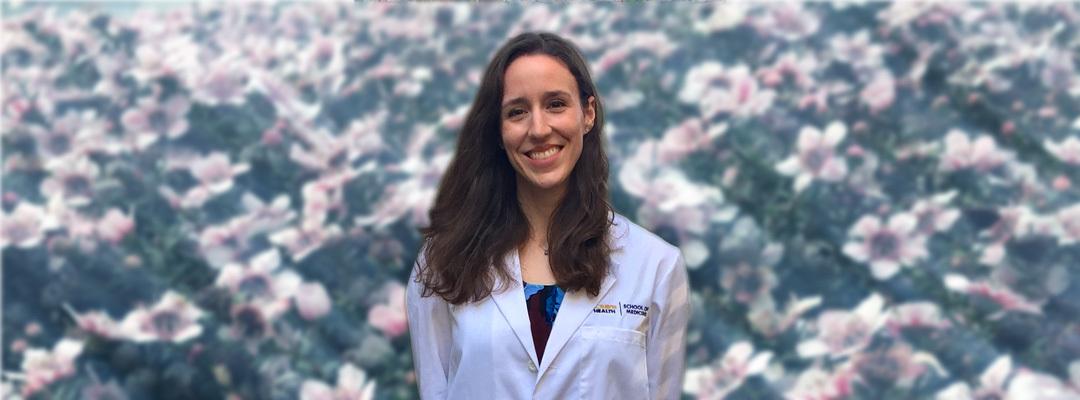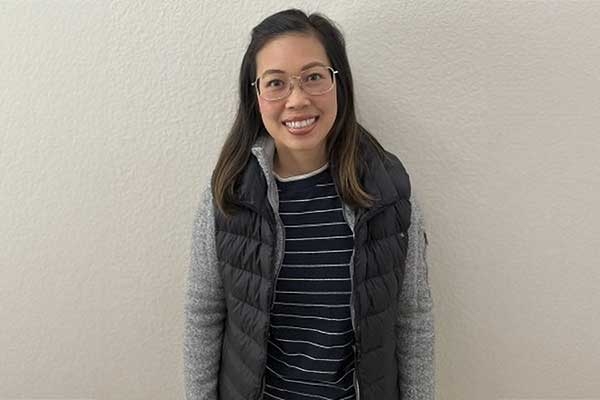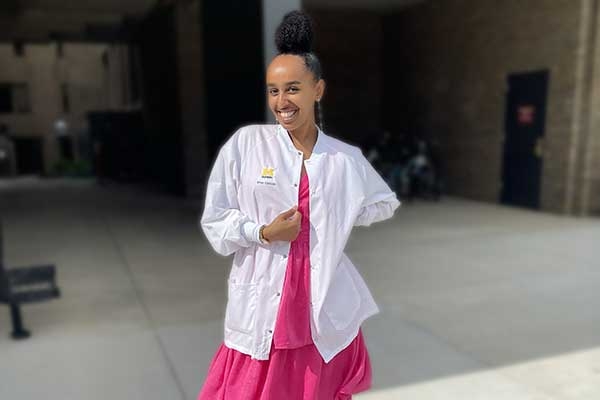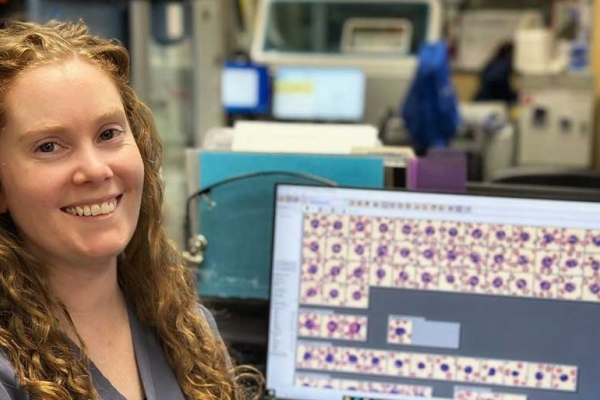“Why?” That’s Laura Potter’s go-to question when it comes to deciphering the intricacies of biological phenomena.
That question is often followed up with, “How does that work?”
Diving deep into the molecular and anatomical structures of the human body. Understanding the correlations and complexities of the cells, tissues, and major organs and systems of the human body.
From a young age, Laura’s natural curiosity formed the bedrock of her educational aspirations. It’s what drove her to attend Stanford, ultimately graduating in 2014 with a B.A. in human biology. It also propelled her into professional work within the medical community.
Professional Experience Engenders Medical Goals
Straight out of university, Laura performed clinical research duties at Bridge HIV within the San Francisco Department of Public Health for two years.
There, she assisted with conducting HIV-preventive vaccine studies, HIV pre-exposure prophylaxis (PrEP) studies, and other studies of biomedical and combination HIV-prevention strategies. From educating potential volunteers about available studies to conducting community outreach to performing quality control and study-retention activities, Laura was gaining extensive real-world experience at the intersection of science and public health.
Drawn by the clinical research world, Laura then moved on to UC Davis Health System’s MIND Institute as a clinical research coordinator, working on neurodevelopmental disorders research for three years.
She continued this specialization a few years later as a clinical research manager at UCSF Helen Diller Family Comprehensive Cancer Center. In this role, Laura led a team of eight clinical research coordinators and CRC supervisors, overseeing the negotiation, activation and execution of all clinical trials in the Thoracic Oncology Program.
Six years of professional work experience devoted to patient care and understanding the “why” of biological phenomena.
But those six years of professional experience also brought out a love of connecting with people. “I have a passion for teaching and empowering others with regards to their health,” Laura says. “My clinical research career confirmed these interests and solidified my goal of becoming a physician.”
But what to do about that six-year educational gap? Especially with an eye toward being a competitive applicant to medical school?

I appreciated that at UC Berkeley Extension, I had the flexibility of designing my own educational path and choosing from a variety of such courses.
Individual Science Courses Fit the Bill
When Laura began researching application requirements for admission to medical school, she soon realized that many of her science prerequisites were outdated. Those classes that she had taken at Stanford as an undergraduate would be nearly expired by the time she was ready to apply.
Fortunately, we offer a slew of science and math prerequisite courses that pre-health students can complete during their "gap" years. And that’s exactly what Laura needed.
“I chose to take UC Berkeley Extension courses because I was interested in the subjects, especially immunology and hematology, and because I wanted to strengthen my application for medical school,” Laura confirms. “By the time I submitted my [medical school application service] AMCAS application in 2019, I had been out of college for five years and my prerequisites were up to nine years old. The addition of more recent coursework was a critical element of my application.”
Laura debated taking individual courses or applying to our formal Post-Baccalaureate Health Professions Program and opted for the D.I.Y. route: “I wanted to curate my own mini post-baccalaureate program of clinically oriented, upper-level biological science courses that could build upon my undergraduate basic science foundations. I appreciated that at UC Berkeley Extension, I had the flexibility of designing my own educational path and choosing from a variety of such courses.”
Laura’s “menu of courses” included:
Virology
Hematology
Immunology
Biochemistry
Custom courses offered in conjunction with UCSF Helen Diller Family Comprehensive Cancer Center
While taking her courses, Laura found a camaraderie and true learning environment fostered by her instructors. Of note, Laura cites:
“I took Dr. Geoff Sargent's Biochemistry course in 2015 with a friend from college. We enjoyed his sense of humor and emphasis on understanding concepts over rote memorization.
“From 2018–2019, I took the Immunology and Virology courses with Dr. Rajeev Banerjee, who is not only a great teacher but also became a good friend and mentor.
“Dr. Chuanyi Mark Lu’s compelling lectures in the Hematology course inspired me to consider a career in hematology/oncology.
“All three of my instructors wrote me letters of recommendation for medical school and were very supportive of my career goals.”
The in-depth courses and supportive instructors vaulted Laura into meeting her goal: She is now a second-year student at the UC Davis School of Medicine. We congratulate Laura on this wonderful achievement!
“I can say—without a doubt—having a strong background in biochemistry, immunology, virology and hematology has proven extremely helpful in the first two years of my medical education,” Laura says with enthusiasm. “Medical school is like drinking from a firehose, and if you have some familiarity with the material, it allows more time to focus on the concepts that are more novel or trickier to understand. Many thanks to my UC Berkeley Extension instructors for setting me up for success in medical school! I am confident that taking the post-baccalaureate coursework during my six-year gap was a key factor in my admission to UC Davis medical school.”
In my experience, UC Berkeley Extension instructors love to teach and genuinely want their students to succeed
Looking Back, Advice for Future Students
Having gone through the full experience of making the decision to reach for a medical career, investing in herself to fill her educational gap and applying herself wholeheartedly to meet that goal, Laura has some words of wisdom to impart:
1. Don't bite off more than you can chew. You will get so much more out of your studies if you aren't overextending yourself and can focus your efforts on doing your best in each course. In my experience, working 40 hours a week and taking one to two courses at a time worked well. I think trying to enroll in more courses simultaneously would have had diminishing returns.
2. Use your time wisely. Long commute? Listen to recordings from lectures or podcasts related to the topics covered in class. Got to work early? Do flashcards for 10 minutes. Lunch break? Review your notes again. There are only so many hours in a day, so balancing work and school will require some creativity and discipline.
3. Make realistic study schedules for yourself. They should incorporate work, class, studying, other responsibilities and breaks/self-care. Sometimes I would get home from a long day at work and studying would be the last thing I wanted to do. Having a schedule kept me accountable to my goals, but also gave me a chance to take breaks when I needed them, preventing either procrastination or burnout.
4. Get to know your instructors. Arrive to class early and talk with them as they're setting up, and stay afterward as they're packing up. Use these moments to introduce yourself, ask about their own careers, inquire about a topic of interest from the lecture or assigned readings, or ask for help if you didn't do as well as you would have liked on that last test. In my experience, UC Berkeley Extension instructors love to teach and genuinely want their students to succeed, and they are very open to offering mentorship, career advice and academic support to students who show an interest.
Take heed of Laura’s advice—she’s well on her way to continuing to understand the “why” of human physiology and the “how” of patient care as a future physician, researcher and advocate-activist for community health.



